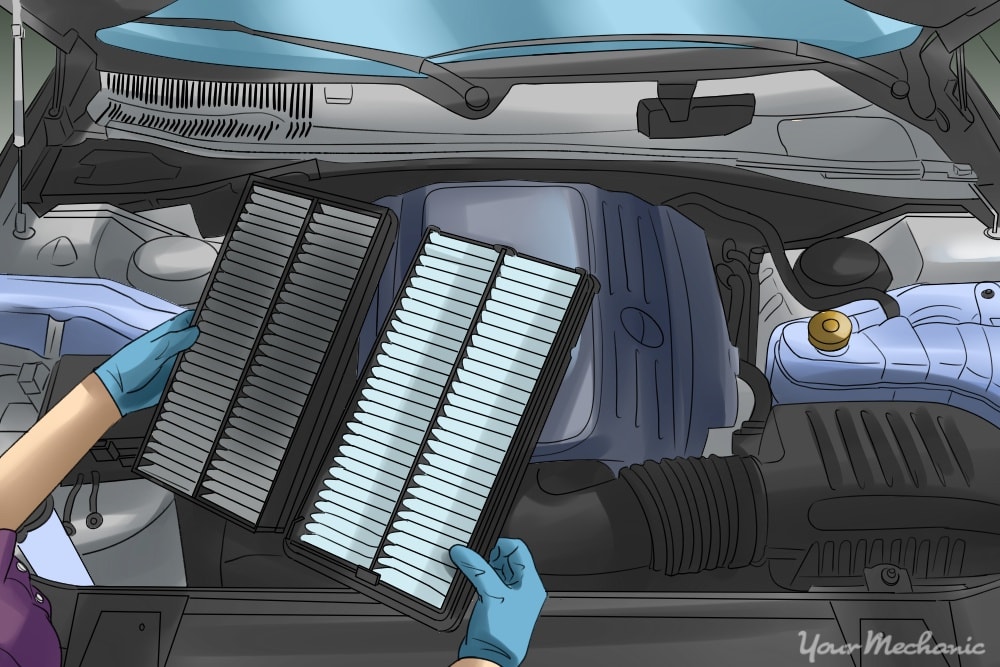

The air filter is designed to capture debris, dirt, and other contaminants — but not oil. Occasionally, when a local service mechanic replaces an air filter, the technician will indicate that engine oil has been found; either inside the air filter housing or embedded inside the used filter. While oil finding its way into the air filter is not typically a sign of catastrophic engine failure, it should definitely not be neglected. Let’s examine the top 3 reasons oil finds its way into the air filter in the first place.
1. A Clogged Positive Crankcase Ventilation (PCV) Valve
The PCV valve is connected to an air intake housing via an often-rubber vacuum hose used to provide a vacuum release inside the engine’s crankcase. This component is typically installed on top of a cylinder head valve cover, where pressure flows from the engine’s bottom half, through the cylinder heads, and exits into the air intake. The PCV valve is similar to an engine oil filter in that it eventually becomes clogged with excessive debris (in this case — engine oil) and should be replaced as recommended by your vehicle’s manufacturer. If the PCV valve is not replaced as recommended, excessive oil will blow through the PCV valve and enter the air intake system.
What’s the solution? If it is determined that a clogged PCV valve is the source of engine oil inside your air filter or air intake system, it should be replaced, the air intake should be cleaned, and a new air filter should be installed.
2. Worn Piston Rings
A second potential source of engine oil leaking into the air filter housing is due to worn piston rings. The piston rings are installed on the outer edge of the pistons inside the combustion chamber. The rings are intended to create a combustion ratio and permit small amounts of engine oil to continue lubricating the inner combustion chamber during each piston stroke. When rings wear out, they loosen and can cause oil ‘blow-by’ — usually displayed by blue smoke coming from the car’s tailpipe while driving. In the early stages of worn piston rings, excessive oil blow-by can cause excessive pressure to build inside the crankcase, which sends more oil through the PCV valve and eventually into the air intake, as stated above.
What’s the solution? If you notice engine oil in the air filter or intake housing, a professional mechanic might recommend a compression test. This is where a mechanic will install a compression gauge on each individual spark plug hole to check the compression of each cylinder. If the compression is lower than it should be, worn piston rings are usually the culprit. Unfortunately, this repair is not as easy as replacing a PCV valve. If worn piston rings are determined as the source, it might be a good idea to start searching for a replacement vehicle, as replacing pistons and rings will likely cost more than the value of the vehicle.
3. Clogged Oil Passages
The final possible reason engine oil will find its way into the air intake system and eventually clog the air filter is due to clogged oil passages. This symptom usually occurs when the engine oil and filter have not been replaced as recommended. It is caused by excessive carbon deposits or engine sludge developing inside the crankcase. When the oil does not flow efficiently, excessive engine oil pressure will be created and cause extra oil to push through the PCV valve and into the air intake.
What’s the solution? In this instance, sometimes changing the engine oil, filter, PCV valve, and replacing the dirty air filter is good enough. However, if clogged oil galleys are discovered, it is usually recommended to flush the engine oil and replace the oil filter at least twice within the first 1,000 miles to ensure the engine’s oil galleys are clear of debris.
What is the Job of the Air Filter?
The air filter on most modern combustion engines is located inside an air intake housing, which is installed on the top of the engine. It is attached to the fuel injection system (or a turbocharger) and designed to efficiently transport air (oxygen) into the fuel system to be mixed with fuel before it enters the combustion chamber. The main duty of the air filter is to remove dirt particles, dust, debris, and other impurities before the air mixes with liquid gasoline (or diesel) to become a vapor. When the air filter becomes clogged with debris, it can cause the engine’s fuel efficiency and power output to decrease. If oil is found inside the air filter, it can also significantly impact the engine’s performance.
If you are completing routine service on your car, truck or SUV, and discover engine oil inside your air filter or air intake housing, it’s probably a good idea to have a professional mechanic come to your location to complete an onsite inspection. Properly identifying the root source may save you a tremendous amount of money in major repairs or even replacing your car before it’s time.



